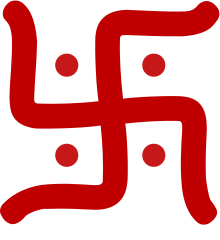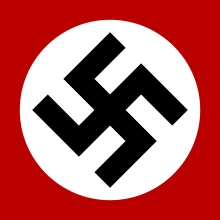swastika
英语[编辑]

印度教的卐字

国社党(纳粹党)的卐字
词源[编辑]
源自梵语 स्वस्तिक (svastika),源自सु (su, “好的”) + अस्ति (asti)(表示“存在”的动词,源自स्वस्ति (svasti))+ 指小后缀 क (ka)。原义为“与幸福有关系的小物件”、“吉祥好运的标志”。英语中最早见于1871年,用来代替希腊化的gammadion。1932年以后,也常用来指纳粹党的类似图案(德语 Hakenkreuz)。
发音[编辑]
- (标准英音) 国际音标(帮助):/ˈswɒstɪkə/, /ˈswɒstəkə/
- (通用美式) 国际音标(帮助):/ˈswɑstɪkə/, /ˈswɑstəkə/
音频 (美国) (文档)
- (新西兰) 国际音标(帮助):/ˈswɔstɘkɘ/
名词[编辑]
swastika (可数 和 不可数,复数 swastikas)
- (可数) 卍/卐字,原是宗教符号,后来成为法西斯、纳粹的象征。
- 1888, Rudyard Kipling, “The Sending of Dana Da”, 出自 In Black and White, Folio Society, 出版于 2005,页号s 423–4:
- This was signed by Dana Da, who added pentacles and pentagrams, and a crux ansata, and half-a-dozen swastikas, and a Triple Tau to his name, just to show that he was all he laid claim to be.
- (请为本引文添加中文翻译)
- 2009, Diarmaid MacCulloch, A History of Christianity, Penguin, 出版于 2010,页号 270:
- It is clear from archaeological finds that they enjoyed wearing Christian crosses, though they might enliven these with such symbols as the Indian swastika which Buddhists had brought them.
- (请为本引文添加中文翻译)
- (法西斯,历史,转喻义,不可数) 纳粹统治
近义词[编辑]
- Black Spider
- (纹章学): crooked cross, cross cramponned, cross cramponnée, cross cramponny
- cross gammadion, gammadion, gammation
- (主要用于建筑学、纹章学) fylfot
- hooked cross
- kolovrat (斯拉夫新异教主义)
- manji
- sauwastika, sauvastika
- sun wheel
- tetraskelion
- Thor's hammer (罕用;一般是指T形符号)
- thunder cross
- twisted cross
拓展阅读[编辑]
荷兰语[编辑]
发音[编辑]
音频 (文档)
名词[编辑]
swastika f 或 m (复数 swastika's)
- 卍字
